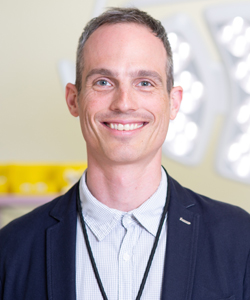AERO helps maximize quality and impact of education research

Q-and-A with Drs. Stella Ng and Ryan Brydges
By Emily Dawson
Jan. 21, 2020 – A few years ago, leadership at Unity Health Toronto recognized the need to improve education research in our health network. With a financial commitment from two St. Michael’s Hospital Foundation donors, the Applied Education Research Operatives (AERO) launched in 2018.
Today, AERO is thriving and this group of 100 clinicians, educators and researchers share a commitment to doing impactful work to bridge education science with innovative education practices. AERO currently includes 10 scientists who cover a range of education science topics, from technical and technological to social and systems.
Its co-founding members and current co-leads are research scientists Dr. Stella Ng and Dr. Ryan Brydges. With an eye on building a sustainable future, they are keen to continue growing this community of like-minded researchers and education scholars.
We spoke with Drs. Ng and Brydges to learn more.
Tell us a bit more about your partnership and AERO.
Dr. Ng: Our research programs are complementary in that Ryan’s research program focuses on technical, procedural skill development and mine focuses on social and humanistic capabilities – both necessary for practitioners to deliver quality healthcare. Both of us are interested in the interface between individuals and systems, meaning how people work within – and might be able to change – established systems.
Dr. Brydges: Through applied education research, we’re trying to address what’s going on in the hospital, in our systems and in the network. Sometimes people feel they’re doing so much education that doesn’t necessarily connect to their applied work environment and its systems. That’s where AERO can contribute the most value.
How does someone get started with the AERO team?
Dr. Brydges: Just reach out! Our services support the scholarship work that people are interested in or may already be engaging in and our goal is to help them formalize this work into something they can disseminate.
Our work together will begin with a consultation, at no cost, and anyone can come to us for this initial consult. Initially, we will discuss areas of funding you already have access to or what funding you will need to secure. If you don’t already have funding in place, we will start with helping you develop a grant proposal.
What should people think about before reaching out to set up a consultation?
Dr. Ng: We often hear in research “start with a question.” We like to frame that differently and we ask people to start with a problem and to identify the gaps in the literature. We often hear from people who have a practical problem that has actually already been addressed elsewhere. So we encourage people to not only think about the question or problem but also to start looking at the literature to determine the best angle we can research to solve that problem.
Dr. Brydges: I like to ask people to think about the “how and why” of the problem. How do you think it’s going now, how do you think you can resolve it, and why do you think that’s the case? This will help me understand your theories about the problem and I can then align this with my own understanding and the existing literature. It gives us more to work with in this first meeting.
What are some of challenges in the perception of education research?
Dr. Brydges: Generally speaking, this is an entire body of science that is somewhat undervalued yet underpins everything we do in health care.
What’s very difficult in education research is understanding where we fall. Are we education? Are we research? Here at Unity Health, though, it’s been refreshing that the research and education leadership groups were both very open to us approaching them and saying “education research is legitimate, we need a group, we need to be recognized as part of our structures.” They’ve supported us every step of the way.
Dr. Ng: The word education can tend to sound static but teaching and learning happens every day, in every setting. Education is not just formal classroom learning. So much of the AERO work in our research programs and consults is learning in every day practice. That’s where a lot of clinicians want to start when they come to us with issues in their practice.
And what does AERO’s future look like?
Dr. Ng: We want to represent education scientists and researchers at Unity Health through advocacy, communication and connection, and we “work to do more work.” We do these consults because there’s a need. It’s mutually beneficial for us to partner with people because we get great connections and ideas, people get support from us, and these consults generate funding that allow us to do more research in the future.
Dr. Brydges: We want to help people think beyond their one project. How can a series of projects build a better understanding about the problem or about the workplace? We encourage people to shift their thinking from just trying to solve the immediate project to imagining longer-term solutions.
***
Contact aero@smh.ca to learn more or to get started on your consult.
